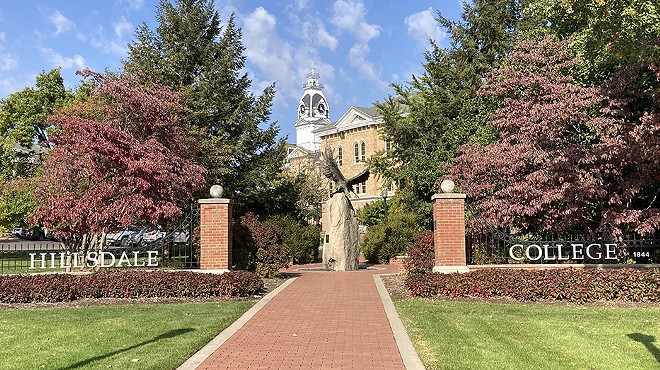Nobody really knows who first said “when fascism comes to America, it will be wrapped in the flag and carrying a cross.”
Sinclair Lewis often gets credit, wrongly. So does Upton Sinclair, also inaccurately. Perhaps, in Detroit, we should cite the senior political radical John Sinclair. Maybe he never said it, but he could have.
Regardless of origin, that old warning is the unspoken essence of the intriguing new book The Kingdom, the Power and the Glory: American Evangelicals in an Age of Extremism by the Michigan author Tim Alberta.
In a presidential election year, Kingdom is an important analysis of the current balance between church and state. Alberta is not some atheist or agnostic using political points against devout Christians who seek moral guidance in politics.
He is a true believer, the son of a conservative and patriotic pastor at the Cornerstone Evangelical Presbyterian Church in Brighton, northwest of Detroit in Livingston County.
But Alberta is clearly appalled at the weaponization of Christianity and its marriage of convenience with the cynicism of former President Donald Trump, who is, once again, a candidate for the White House.
“His legacy in the sweep of western Christendom was already secure,” Alberta writes of Trump as he began his 2024 campaign for his electoral restoration and resurrection.
“More than any figure in American history, the forty-fifth president transformed evangelical from spiritual signifier into political punch line, exposing the selective morality and ethical inconsistency and rank hypocrisy that had for so long lurked in the subconsciousness of the movement.”
Skeptics might wonder what took Alberta so long to wise up. He needed a personal revelation. His road-to-Damascus moment came five years ago, after his father died. Some parishioners approached young Alberta not only with sympathy for his loss but also with harsh words for his political writing.
It seems that Rush Limbaugh, the late radio commentator, had criticized Alberta for a previous book Alberta wrote about Trump. Suddenly, Alberta saw the light and realized the toxicity of right-wing propaganda mixed with the cultural fears of a susceptible Christian congregation.
It turned personal.
“Some of it was angry, some of it was cold and confrontational,” Alberta writes. “One man questioned whether I was truly a Christian. Another asked if I was still on ‘the right side.’ All while Dad was in a box a hundred feet away.”
Alberta doesn’t just preach in Kingdom. He interviews and profiles national leaders of evangelical Christianity. He listens to both hard-line right-wingers and disillusioned local pastors.
“More than any figure in American history, the forty-fifth president transformed evangelical from spiritual signifier into political punch line.”
tweet this
Some of his best reporting illuminates the manipulations of Jesus-hustlers like Ralph Reed and Charlie Kirk. And Alberta brings plenty of fire and brimstone down upon the dynastic and scandal-singed Jerry Falwell family that built Liberty University in Virginia into an earthly kingdom.
“Falwell Sr. may have reveled in provoking the thought police of his time,” Alberta writes, “but his school had become its own totalitarian regime.”
He recounts the firing of Dr. Aaron Werner, a professor of divinity at Liberty, who tried to change the culture.
“I think we need to be honest about the Falwells,” Werner said. “Jerry Sr. was always a bit of a scoundrel. And Jerry Jr. perfected the art of using fear and hatred as a growth strategy . . . It’s gained them a lot of power and a lot of money, the two things these people really worship.”
Some sections of Kingdom feel like journalism written in a hurry to freeze a moment in time. (Alberta is a staffer at The Atlantic.) He uses clichés that Werner “stepped on toes and slaughtered sacred cows. . . the clock began to tick.” Some prose is workmanlike and some material dated.
But the best characterizations are vivid. For instance: One of Alberta’s most sympathetic characters is Mike Pence, the former vice-president and fervent evangelical whose early career included a stint as a radio talk-show host.
“Unlike all the craven, self-indulgent schemers who had surrounded Trump,” Alberta writes, “the vice president knew the difference between right and wrong.”
That moves Pence from sympathetic to pathetic on Jan. 6, 2021, when Trump’s rioting mob at the U.S. Capitol chanted “Hang Mike Pence!” until the Secret Service whisked him away. After Trump vacated the White House, he ridiculed Pence at Reed’s “Faith and Freedom Coalition” at Opryland in Nashville.
According to Alberta’s report, Trump told the evangelicals that Pence lacked “courage.” The audience booed even the mention of Pence.
“(Trump) mocked the former vice president as a ‘robot’ who would not deviate from his constitutional duty of counting aloud the certified Electoral votes . . .. Trump said Pence was too ‘afraid.’”
Alberta later attends a Pence speech at Hillsdale College, a bastion of white, Christian nationalism located in Southern Michigan, near Ohio and Indiana, the latter Pence’s home state. Pence there joked with the audience in the ornate Hillsdale chapel there that he is like Rush Limbaugh on decaf.
That brought a chuckle, Alberta writes, from an audience that nevertheless found Pence “not tough enough to meet the moment . . . A Sunday school teacher wasn’t going to win this fight. They needed a warrior.”
Other Michigan angles include a lengthy section about Rachel Denhollander of Kalamazoo whose efforts against sex molester Dr. Larry Nassar of Michigan State led her to further exposure of similar abuse among Christian churches. The latter caused dissent.
“In the four years that followed the Nassar verdict, Denhollander went from Esther to Jezebel in the eyes of many evangelical shot-callers,” Alberta writes. “Turning her attention and considerable legal savvy to the mushrooming sex-abuse scandals inside the Church — most notably within the Southern Baptist Convention — Denhollander took on the mightiest and most entrenched interests in American Christendom.”
Alberta begins each chapter with a quotation from Matthew, Mark, Luke, or John. He ends the text of his epilogue with the one-word sentence “Amen.” But there is a more topical and temporal prayer-feel a few pages later in the conclusion to his acknowledgements.
On page 452, Alberta salutes the pastors of the blue-robed Detroit Lions’ congregation that gathers for Sunday services at Ford Field.
“I want to thank Dan Campbell and Brad Holmes for building a contender and restoring this fan’s hope,” Alberta writes.
Finally, Alberta concludes by singing the choir’s holy hymn as his kicker quote.
“Forward down the field!”
Subscribe to Metro Times newsletters.
Follow us: Google News | NewsBreak | Reddit | Instagram | Facebook | Twitter








